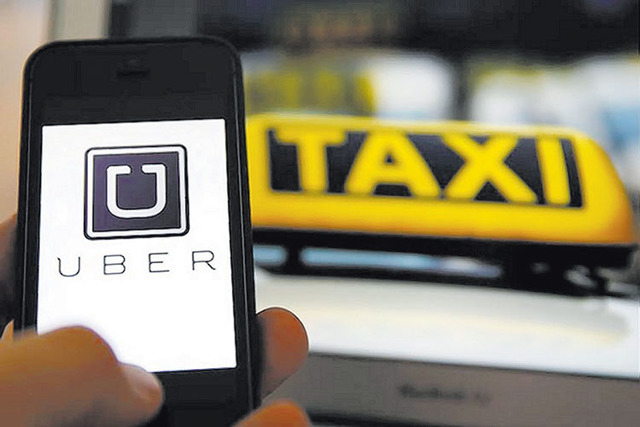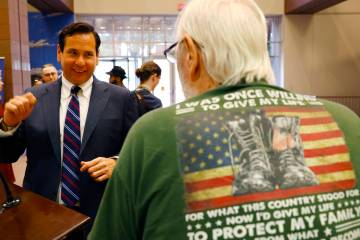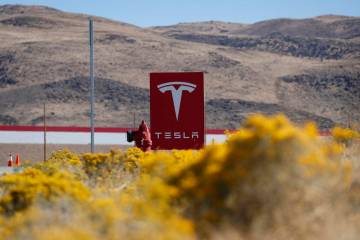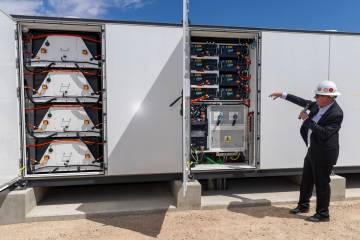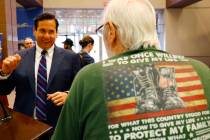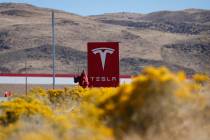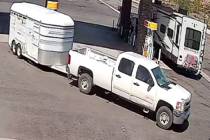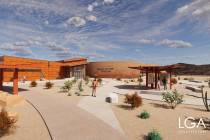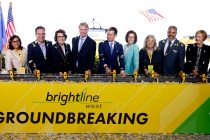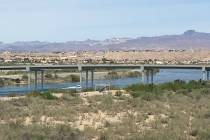Uber temporarily suspends operations in Nevada
Uber, the maverick ride-sharing company that has been bending the state’s transportation rules for a month, ceased operations in Nevada late Wednesday, vowing to return when it finds a clear path to operating legally in the state.
The decision for the temporary shut-down was reached after an analysis by Uber management and was announced publicly in a blog post on the company’s website. A company spokeswoman issued an emailed statement just after 10 p.m.
“It’s unfortunate that Nevada is the first state in the nation to temporarily suspend Uber,” said spokeswoman Eva Behrend. “That means nearly 1,000 jobs just disappeared overnight and those residents lost their ability to earn a living. On the eve of Thanksgiving, when Nevadans should be celebrating with family, now many are worried about how they’re going to pay their bills.”
The San Francisco-based technology company was dealt two legal blows earlier this week, the more lethal one occurring Tuesday when Washoe County District Court Judge Scott Freeman’s issued a preliminary injunction preventing Uber from operating statewide.
On Monday, a panel of the Nevada Supreme Court, in a split vote, directed the Washoe County court to hear the case. Uber officials had argued before the high court for the case to be heard in Clark County where Judge Douglas Herndon heard a similar pleading and opted not to issue an injunction.
“We remain committed to working with Nevada’s leaders to create a permanent regulatory framework that affords Nevadans the flexibility and innovation offered by Uber,” Behrend said in her email.
After Uber officials reviewed the court order Wednesday and evaluated their options, the decision was reached. The company has never stated how many contracted drivers it has agreements with in Nevada and the statement noting 1,000 jobs lost was the first indication of Uber’s fleet size.
The company began operations on Oct. 24. Regulatory police officers with the Nevada Taxicab Authority and the Nevada Transportation Authority immediately went after Uber drivers as illegal and unlicensed carriers. Under Nevada’s strict common carrier regulations, drivers are to be tested and their vehicles inspected. Regulators also require proof of insurance. While Uber stated that their drivers are thoroughly investigated and must drive late-model vehicles and that the company holds a blanket insurance policy for its drivers when transporting customers, state officials said it wasn’t good enough.
Taxicab and Transportation Authority officers cited Uber drivers and impounded their vehicles; Uber’s legal team quickly arranged to pay fines and get the cars returned.
Nearly 50 cars were impounded over the first month of operation.
The Nevada Attorney General’s Office, working on behalf of the Transportation Authority, sought injunctions in Washoe and Clark counties as well as Carson City since violations were occurring in all three jurisdictions. The Supreme Court panel determined that the Washoe action was filed first, which was why the matter was heard there.
Andrew MacKay, chairman of the Transportation Authority board, and Bruce Breslow, director of the state’s Department of Business and Industry, testified for the state.
At the heart of the issue was Uber’s contention that it isn’t a transportation company, but a technology company that facilitates communication between a contracted driver and a person seeking a ride through a smartphone app.
But regulators, backed by executives of taxi and limousine companies, said Uber was attempting to do what they have been doing as licensed carriers for decades — transporting people from one place to another for a fee.
The battle between Uber and the taxi companies has fostered passionate debate from both sides of the argument. Uber backers say the company’s app is a technological advancement for the transportation industry that can’t be ignored in a state that views itself as technologically progressive, especially since Uber operates successfully in markets all over the world.
Traditional taxi industry supporters say Uber drivers aren’t as safe because they aren’t policed by regulatory bodies whose mission is to provide safe transportation to the riding public. They cite numerous incidents in which Uber drivers have been involved in accidents and incidents involving involving assaults and police chases.
The Uber debate also has put a spotlight on Nevada’s transportation regulatory system that critics say is antiquated and protectionist.
The blog post announcing the shutdown on Uber’s site, dated Nov. 26 and titled, “Nevada, we’re here for the long haul,” written by “William,” alludes to confusion about the Uber business model and calls on Gov. Brian Sandoval to help get the company’s drivers back on the road.
“It is clear that Uber has met a real need of supporting access to more transportation options, bringing accessibility to previously underserved communities,” the post says. “And, we have opened doors to thousands of people looking to supplement their income or find a way to support themselves and their family. We remain committed to the tens of thousands of Nevadans who already rely daily on Uber.
“Nevadans have spoken and we look forward to working with Gov. Sandoval — a known champion for innovation and job creation — to ensure that the state continues to grow its economy, foster innovation and encourage healthy competition.”
Follow @RickVelotta on Twitter. Contact reporter Richard N. Velotta at rvelotta@reviewjournal.com or 702-477-3893.



